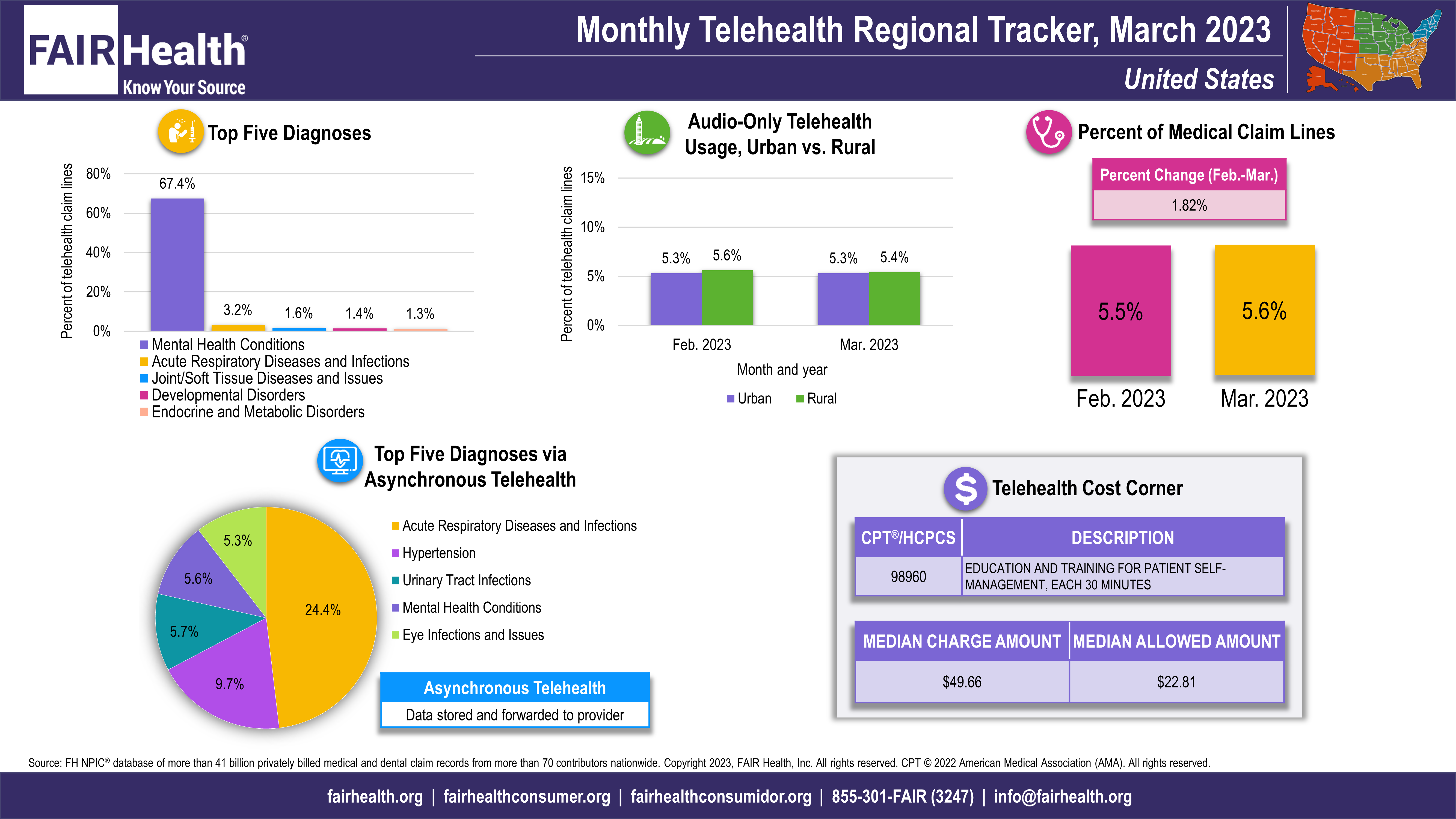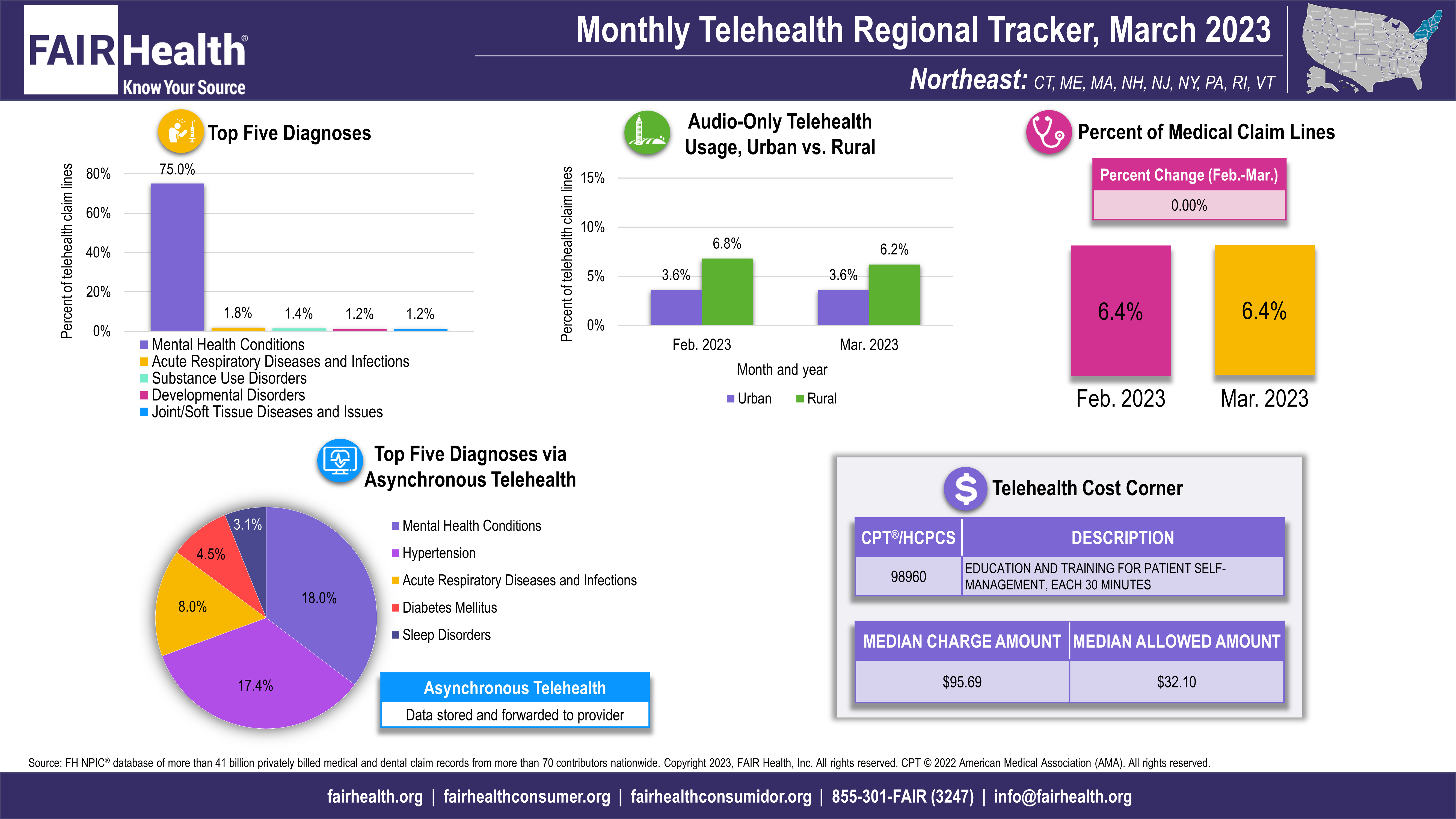
- Center on Health Equity & Access
- Clinical
- Health Care Cost
- Health Care Delivery
- Insurance
- Policy
- Technology
- Value-Based Care
Contributor: Mental Health Conditions Rose Nationally in Share of Telehealth Claim Lines
In March 2023, national telehealth utilization rose 1.8%, up from 5.5% of medical claim lines in February, according to new data from FAIR Health’s Monthly Telehealth Regional Tracker.
National telehealth utilization increased 1.8% in March 2023, from 5.5% of medical claim lines in February to 5.6% in March, according to FAIR Health’s Monthly Telehealth Regional Tracker (FIGURE 1). The increase followed a decline in February 2023. In March, telehealth utilization also increased in 2 of the 4 US census regions—the Midwest (2.4%) and the West (2.6%). The other regions stayed level, with zero percent change in the Northeast and the South. The data represent the privately insured population, including Medicare Advantage and excluding Medicare fee-for-service and Medicaid.
Figure 1. Monthly Telehealth Regional Tracker, March 2023, United States

(Source: FAIR Health)
Top 5 Telehealth Diagnoses
The top 5 telehealth diagnoses remained the same in March 2023 as in February 2023 nationally and in the Midwest, Northeast and West. In the South, urinary tract infections entered the rankings in fifth place; hypertension rose from fifth place to third place; and encounter for examination, previously in third place, fell off the list entirely.
In March, mental health conditions, the top-ranking diagnosis nationally and in every region, rose from 66.7% of telehealth claim lines nationally in February to 67.4% in March—the third straight month of national increases.
The percentage of telehealth claim lines for the second-place diagnosis, acute respiratory diseases and infections, decreased nationally in March, falling from 3.5% in February to 3.2% in March. This was the third consecutive national monthly decrease for this diagnosis.
Asynchronous Telehealth
In March 2023, among the top 5 diagnoses via asynchronous telehealth, hypertension continued to rank second nationally and in the West, fourth in the South and first in the Midwest, as it had in February. In the Northeast, hypertension dropped from first place in February to second place in March and was replaced by mental health conditions, which moved up from second place in February to first in March (FIGURE 2).

(Source: FAIR Health)
In March, sleep disorders entered the rankings in the Northeast at number 5, replacing urinary tract infections. Sleep disorders increased in percentage of asynchronous telehealth claim lines in the Midwest, climbing from number 5 to number 4 in the rankings.
Audio-Only Telehealth Usage
In March 2023, utilization of audio-only telehealth services decreased in rural and urban areas in the Midwest. It also decreased in the Northeast and nationally but only in rural areas, while it stayed level in urban areas. By contrast, in the West, utilization decreased in urban areas but remained the same in rural areas. In the South, audio-only telehealth utilization increased in urban areas and remained level in rural areas.
Similar to February, utilization of audio-only telehealth services was generally higher in March in rural areas than urban areas, except in the South, where audio-only telehealth services accounted for 10.5% of telehealth claim lines in urban areas compared to 5.5% in rural areas.
Telehealth Cost Corner
For March 2023, the Telehealth Cost Corner spotlighted the cost of CPT 98960, education and training for patient self-management, each 30 minutes. Nationally, the median charge amount for this service when rendered via telehealth was $49.66, and the median allowed amount was $22.81.
For the Monthly Telehealth Regional Tracker, click here.
2 Commerce Drive
Cranbury, NJ 08512
AJMC®
All rights reserved.